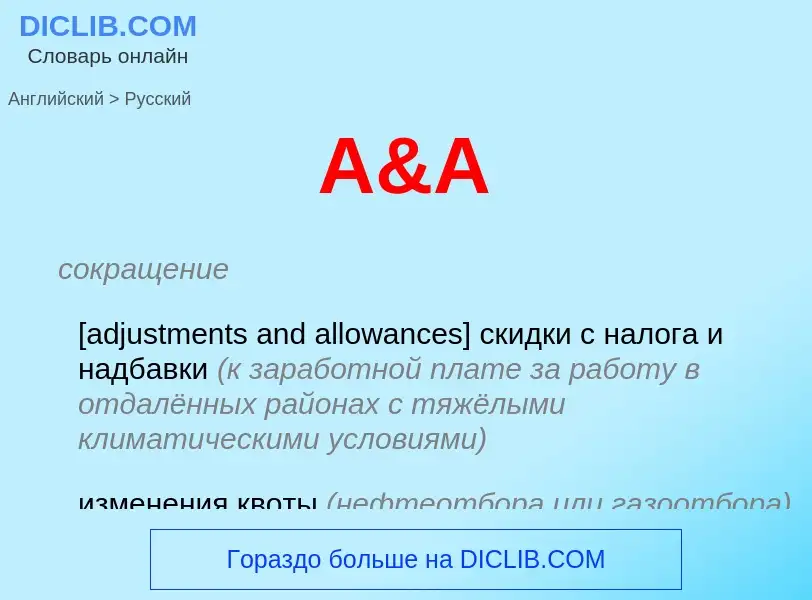Traducción y análisis de palabras por inteligencia artificial ChatGPT
En esta página puede obtener un análisis detallado de una palabra o frase, producido utilizando la mejor tecnología de inteligencia artificial hasta la fecha:
- cómo se usa la palabra
- frecuencia de uso
- se utiliza con más frecuencia en el habla oral o escrita
- opciones de traducción
- ejemplos de uso (varias frases con traducción)
- etimología
T A A Trade Agreement Act - traducción al ruso
сокращение
[adjustments and allowances] скидки с налога и надбавки (к заработной плате за работу в отдалённых районах с тяжёлыми климатическими условиями)
изменения квоты (нефтеотбора или газоотбора)
общая лексика
положительный полюс батареи накала
[ei]
общая лексика
шестнадцатеричная цифра, A16 1010 10102
судно первого класса в регистре английского Ллойда
разговорное выражение
первоклассный
превосходный
замечательный
первый сорт
существительное
общая лексика
1-я буква английского алфавита
(A) высшая отметка
«отлично»
первый номер по порядку
группа крови A
в грам. знач. прил. (также как компонент сложных слов) (A) имеющий форму буквы А
А-образный
редкое выражение
кнопка телефона-автомата (используется при междугородной связи в Великобритании)
несовременное выражение
кинофильм
на который дети и подростки допускаются только в сопровождении взрослых
фильм только для взрослых
предмет высшего сорта
класса и т. п.
малая полнота обуви
первый или второй номер бюстгальтера
полиграфия
буква или литера A или a
математика
a (обозначение известного числа) (a)
музыка
ля
Definición
Wikipedia

A trade agreement (also known as trade pact) is a wide-ranging taxes, tariff and trade treaty that often includes investment guarantees. It exists when two or more countries agree on terms that help them trade with each other. The most common trade agreements are of the preferential and free trade types, which are concluded in order to reduce (or eliminate) tariffs, quotas and other trade restrictions on items traded between the signatories.
The logic of formal trade agreements is that they outline what is agreed upon and the punishments for deviation from the rules set in the agreement. Trade agreements therefore make misunderstandings less likely, and create confidence on both sides that cheating will be punished; this increases the likelihood of long-term cooperation. An international organization, such as the IMF, can further incentivize cooperation by monitoring compliance with agreements and reporting third countries of the violations. Monitoring by international agencies may be needed to detect non-tariff barriers, which are disguised attempts at creating trade barriers.
Trade pacts are frequently politically contentious since they may change economic customs and deepen interdependence with trade partners. Regulatory changes may also be contentious. For instance, trade agreements have been used by nicotine- and alcohol-industry lobbyists to block, delay, and weaken public health measures like health warning labels. Free trade agreements have also attempted to regulate internet use, extend and strengthen legal monopolies, and change criminal law, privacy law, healthcare, labour law, and environmental law. Increasing efficiency through "free trade" is a common goal. For the most part, governments are supportive of further trade agreements.
There have been however some concerns expressed by the WTO. According to Pascal Lamy, Director-General of the WTO, the proliferation of regional trade agreements (RTAs) "...is breeding concern — concern about incoherence, confusion, exponential increase of costs for business, unpredictability and even unfairness in trade relations." The position of the WTO is that while the typical trade agreements (called preferential or regional by the WTO) are useful to a degree, it is much more beneficial to focus on global agreements in the WTO framework such as the negotiations of the current Doha round.
The anti-globalization movement opposes such agreements almost by definition, but some groups normally allied within that movement, e.g. green parties, seek fair trade or safe trade provisions that moderate real and perceived ill effects of globalization.








